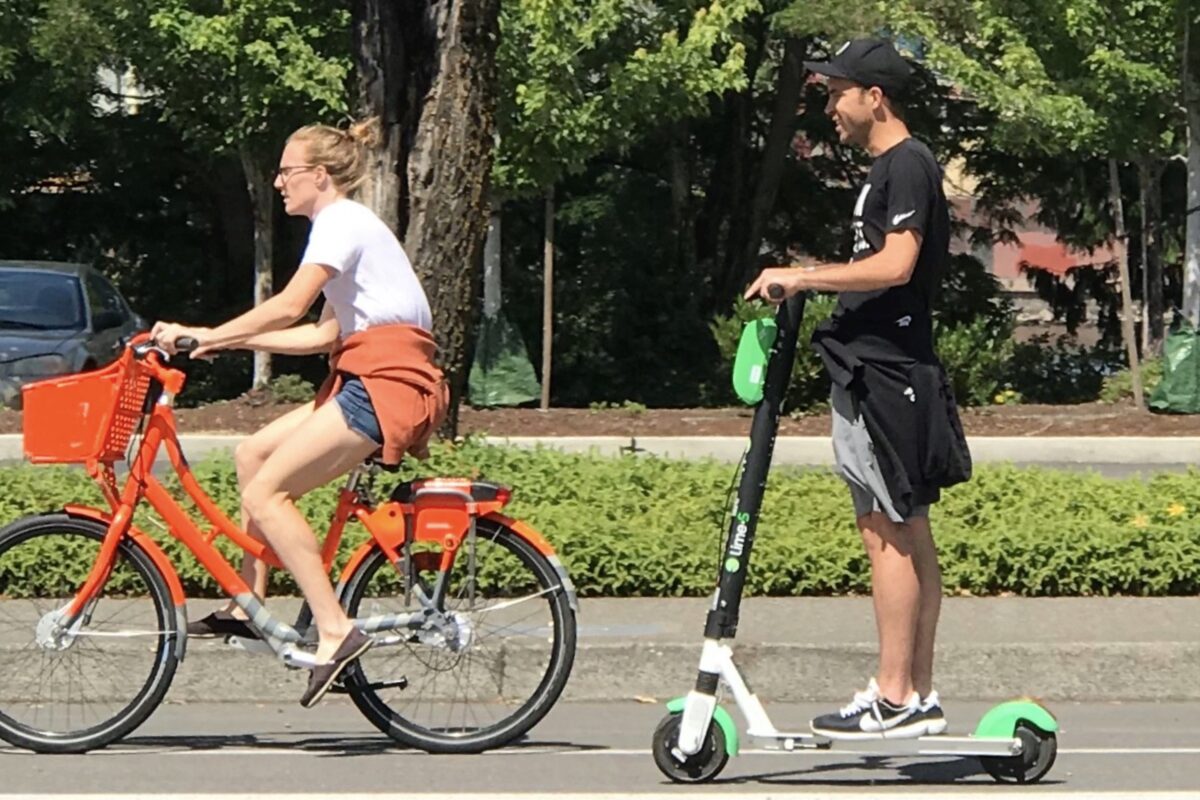
(Photo © J. Maus/BikePortland)

The micromobility industry faced headwinds even before the coronavirus pandemic took hold of cities. But local startup Ride Report has wind at their back thanks to $10 million in venture capital funding announced earlier this month.
I caught up with company Founder and CEO (and BikePortland subscriber!) William Henderson this week to learn more about the state of micromobility and how the $10 million from Palo Alto-based Unusual Ventures will impact his business.
Ride Report’s journey began five years ago when Henderson launched an innovative bicycle counter that was used by the Portland Bureau of Transportation. He then added a smartphone app that gauged bike trip quality for thousands of users and over 12 million miles before it was shut down last year.
“We’ve been talking for a while about ‘micromobility winter’… We’re very grateful to be where we are today, because 2020 looks like it is going to be a turbulent year.”
— William Henderson, Ride Report CEO
In early 2018, Henderson melded his company’s experience with government contracts, bicycling data and software into a service that allows organizations to manage shared vehicle data. Riding the wave of shared electric scooters and bikes, Henderson raised $3.4 million in seed funding in November 2018. Today the Ride Report team has grown to 18 people and has relationships with nearly two dozen fleet operators and over 60 cities worldwide including Portland. So far this year, the company has tracked nearly 100,000 unique vehicles.
Advertisement

(Photo: Ride Report)
“We’re very grateful to be where we are today, because 2020 looks like it is going to be a turbulent year,” he shared. “We’ve been talking for a while about ‘micromobility winter,’ which started as a set of trends we were seeing from within the industry, but now has taken on a new meaning as we confront the disruption of coronavirus – and a possible recession.”
“The need and potential for micromobility is as real as ever, but there are going to be some serious headwinds,” Henderson cautioned.
It seems counter-intuitive that as the micromobility business gets tougher, Ride Report gets stronger. But Henderson says as virus-induced economic anxieties loom, cities tighten regulations on scooters and bike share fleets age and transition to electric power, fleet operators need help even more. “With operators struggling to reach profitability and survive, our job is more important than ever.”
Ride Report works both sides of the equation: They help cities craft sensible regulations and they help operators follow them.
“Ride Report can literally make the difference between cities having or losing access to micromobility.”
One of Ride Report’s services is to help operators (like Lime and Bird) make sense of city regulations, which are often tied to steep fees for non-compliance. In today’s lean times for operators, if a market isn’t profitable, they’ll just pack up and leave. In those cases, Henderson says, “Ride Report can literally make the difference between cities having or losing access to micromobility.”
Data privacy is another area Henderson has positioned Ride Report to help with. “In our European cities, we are already seeing a lot of concern and confusion around what data can be collected and shared under GDPR [General Data Protection Regulation, an EU law]. We think similar regulations are coming to this country, and this has the potential to totally derail City efforts to regulate shared mobility technologies.”
Advertisement
For a company that banks on data, Henderson advocates against collecting too much of it. “In the real world, advocates have helped push cities to make their streets more people-centric,” he says. “In the digital world, I think we need a more people-centric approach too – which means restricting data collection for both private and public entities.”
Then there are usage fees for micromobility operators. While fees on drivers haven’t caught on as quickly as many transportation reform activists would like, Henderson sees various forms of congestion pricing as inevitable. In some ways, the success in taxing scooter and bike share operators might even trickle to taxing drivers. Whatever happens, Henderson will lobby cities to make sure fees for micromobility operators are fair and, “Don’t tax the industry out of existence.”
With the coronavirus crisis, the furthest thing from the City of Portland’s mind is regulating our scooter and bike share fleet. But with so many people working from home and a massive decrease in car trips, we might see Biketown and scooters rise from the ashes once the pandemic lets up.
When it does, remember this fledgling Portland company crunching the data and navigating the regulations behind the scenes.
— Jonathan Maus: (503) 706-8804, @jonathan_maus on Twitter and jonathan@bikeportland.org
— Get our headlines delivered to your inbox.
— Support this independent community media outlet with a one-time contribution or monthly subscription.


